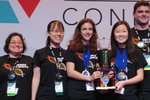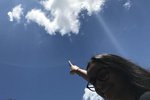Genes in Space 2018 STEM Competition Launches
Students Invited to Design DNA Experiments for the International Space Station
Cambridge, MA, January 16th, 2018 – Students in grades 7-12: pioneer research on the International Space Station (ISS) by designing DNA experiments for space! Genes in SpaceTM, a competition that seeks to inspire the next generation of space scientists, opened a call for entries today.
Genes in SpaceTM challenges students to design original DNA experiments that address real-life challenges and opportunities of space exploration. Proposals are submitted by teams of one to four students and must use the ISS as a testbed for space exploration. The contest is a collaboration between miniPCR and Boeing with generous support from CASIS, Math for America, and New England Biolabs, Inc. Genes in SpaceTM is free, and does not require equipment.
The winning experiment is conducted in space, and samples are returned to Earth for winners to analyze! Submission deadline is April 20th, 2018.
25 teams win a miniPCR DNA Discovery System™ for their educational institutions. Five Finalist teams additionally receive mentoring from Harvard University and Massachusetts Institute of Technology scientists and attend the 2018 ISS R&D Conference, where they present their ideas to a panel of judges. The winning team attends Space Biology Camp and watches their experiment launch into space!
"We've seen some outstanding experiments performed through this program that are helping decipher fundamental elements of health in space," said Boeing's Scott Copeland, co-founder of the Genes in Space program. “Inspiration was at the center of this effort so it’s very rewarding to see how many students are getting excited about these opportunities."
"This competition gives students access to an innovative science research program and provides teachers with exciting opportunities to engage students in science and mathematics, often mentoring them throughout the application process,” said John Ewing, MƒA President.
Anna-Sophia Boguraev from Bedford, New York won the first Genes in Space competition in 2015. Her
experiment was the first PCR experiment conducted in space and was recently published in the Nature Partner Journal npj Microgravity. A total of five
students have won the contest. Julian Rubinfien (2016) and Alia Al Mansoori
(UAE) have conducted experiments aboard ISS. The two winners of the 2017
contest, Elizabeth Reizis and Sophia Chen, are scheduled to launch their
experiments to space in March.
Learn more: www.genesinspace.org
Media contacts:
miniPCR: Emily Gleason, genesinspace@minipcr.com, 781-990-8727
Boeing:
Steven Siceloff, steven.p.siceloff@boeing.com, 281-226-4872



